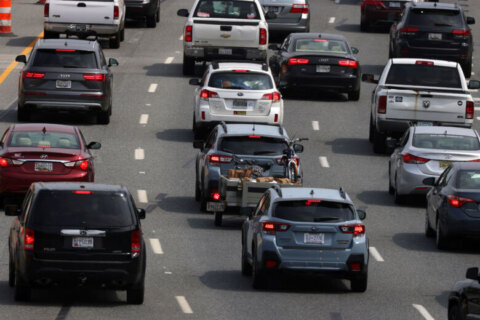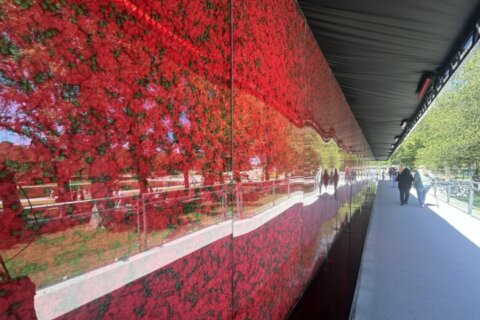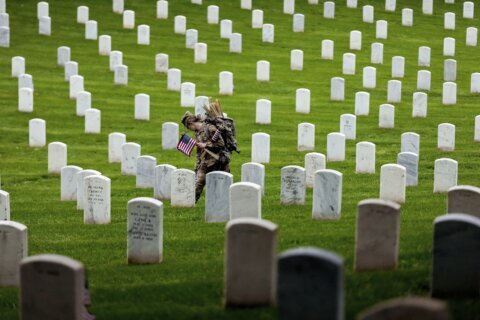WTOP’s Social Media & Digital Engagement Specialist Brett Snyder spoke with traffic reporters Mary DePompa and Reada Kessler about the best tips and tricks to avoid some of the Memorial Day traffic.
A transcript of the Q&A is below:
Brett: Let me ask you guys a question. Just off the top of your head, do you think this is the worst weekend for traffic around the D.C. area? Or is the Fourth of July worse? I’m curious to hear your take on that.
Reada: I think Thanksgiving is the worst. Thanksgiving is the absolute worst. But the reason that can make this the worst this year is because all the COVID restrictions are lifting, and there’s going to be a ton of people finally getting out and going places. So I’m curious to see what it looks like.
Brett: And Mary, what do you think? Do you also think Thanksgiving is a little bit worse than Memorial Day or Fourth of July?
Mary: Inherently, yes, I would say Thanksgiving. And I’ve been stuck in the holiday traffic for Christmas as well, myself. That’s no picnic, either. You’re trying to leave town. But yeah, for Memorial Day, most folks are going in one direction. They want to go to the Eastern Shore. And there’s a lot of [people doing so].
Brett: So we’ll kind of get started with our conversation. Obviously, you both have been in traffic for most of your career, watching different Memorial Day weekend traffic patterns. So we’ll start with a question that a lot of drivers want to know, which is: What are the worst times to really drive during Memorial Day weekend? When should you really avoid [traveling]?
Reada: I mean, I think the easiest thing is to avoid the middle of the day. I work middays, so that’s when we start to see the traffic getting really bad. I mean, the best advice I can give you is to leave early or late, and avoid that middle portion into the evening rush hour.
Brett: And Mary, would you agree with that?
Mary: Yes, that’s definitely true. And a lot of people are creatures of habit and it changes year to year, they try to avoid what happened last time mentality. So each year is different. Last year, we had the void in travel, so there wasn’t a lot of traveling with the COVID restrictions. And I’d like to remind people that this is the first year that they have cashless tolling. It opened last May, but Memorial Day wasn’t the typical Memorial Day. So each year, people gauge what they did the year before, and how they’re going to plan for the next season, and [last year] we didn’t have one. So it’ll be interesting to see how that changes.
Brett: What do you think the best times would be to drive down to the Eastern Shore and drive back after the weekend? I mean, are there specific times? Do you have to go before 6 a.m.? What would you say to that?
Reada: I always hate to be married to specific times, because that can get a little funny. But I mean, on your way home, it’s either leave early or stay late. If you’re at the beach, you either try to get out of town as early as possible on the day you’re leaving, or you stay late, spend the day on the beach and come back later. The big variable this weekend for [shore-bound traffic] is going to be the weather. Because it [will be] raining, they will not run the two-way traffic on the westbound span of the bridge, and then you’re going to have 10-mile backups on Route 50 just because of all the people.
Brett: That totally makes sense. And Mary, in your opinion, do you think the same type of thing?
Mary: Yeah, absolutely. The weather is the big, big thing to watch out for. Monday is probably going to be the better day. People may try to stay on the beach or squeeze a day in with sunshine, so they would leave later. Families tend to leave a little earlier with the kids and stuff. So that’s a bigger impact, right around dinner time. Everybody’s clamoring to get to the three lanes across the Chesapeake Bay. You have to gear it just right.
Reada: I’d like to ask a question to Mary, if you don’t mind, Brett.
Brett: Yeah, go ahead.
Reada: This can also be a big holiday week, and a lot of holiday things are Saturday to Saturday. I know you work Saturday morning, so what do you think is the best time to leave to go to the beach if you decide to wait until [this] Saturday?
Mary: I can tell you, but I hate to say this out loud because then it’ll come back and haunt me – but a lot of folks [will] have left by Thursday or Friday and they’re scared of Saturday morning. So, the past few years, on Saturday morning, if you got out before 10 a.m., you were doing OK.
Brett: Yeah; I think that’s a good point. And I think like you guys have talked about, everything is a little bit variable this year. Do you think it really changes from year to year that much, and [that] the year before really helps us learn about what the following Memorial Day weekend will look like?
Reada: I mean, this year is different than all others. I mean, when have we emerged from a pandemic recently? So I mean, I think normally, not really. I think the patterns kind of stay the same in terms of when people leave and when they come back. But like I said before, I am incredibly curious to watch the traffic flow both to the beach or wherever you’re going. And on the way back, just to see what happened this year because of more people getting on the roads.
Brett: And that totally makes sense. Does local D.C. traffic also pick up on Memorial Day weekend? Will we start to see more traffic in the local areas, or is it really just when you head to and from the Eastern Shore?
Mary: You’d normally get a lot of travelers passing through, but it never gets as bogged down. In fact, some of the I-95 corridor travel is a little lighter on Memorial Day weekend. But the past several years, since I’ve been at WTOP, we’ve had Rolling Thunder on Saturday and Sunday with thousands of motorcycles heading into town to honor our Veterans. So all of the motorcycles were trying to get downtown subsequently holding traffic in their path. I don’t know if you’ve ever seen it or been a part of it or been stuck in it. It’s been a big thing. But there is no Rolling Thunder this year, they’re actually doing an AMVETS Rolling to Remember. There is going to be about 100,000 bikes at RFK Stadium, and then they’ll travel downtown. But a lot of people aren’t traveling downtown during the weekend. So it’ll be interesting to see how impactful that will be, as well.
Brett: And yeah, and I think we’ll obviously have to see kind of what patterns emerge from that local traffic, but as you said, it’s not going to be as bad as heading to and from the shore. And obviously, the big way to get to the shore, especially from the local D.C. and Maryland and Virginia areas, is along the bridge. Traffic backs up at the bridge. Are there any tips you have for people going across? Is there any way to avoid it? I mean, aside from going all the way up and down, it’s really unavoidable. Correct?
Reada: Exactly. Because you’d have to go way out of your way to avoid traveling across the Bay Bridge. I mean, that’s the reason why the delays get so bad — there really aren’t any other good options. If you’re in Virginia, you’ve got to go all the way around through the Chesapeake Bay Bridge Tunnel, or if you’re heading up toward Baltimore, you can go around through Delaware and around Route 1 that way. But you don’t want to do that if you’re coming from Annapolis, or if you’re coming from downtown D.C. You don’t really want to take that way to go.
Brett: Yeah, it just wouldn’t make sense. And Mary, do you think that with the weather coming in, does that play a huge part in the traffic, especially on the bridge? I mean, we all hear the old adage that the rain adds to the traffic on the bridge, because drivers have either slowed down, or they have a harder time [driving]. I guess the question is, how much of a difference does it make if it’s a sunny day versus a rainy day if you’re driving along the bridge on Memorial Day weekend?
Mary: Well, yeah, as Reada said, they have the two-way travel on the westbound span of the bridge. They have three lanes to the Eastern Shore, but if it rains they discontinue that for safety reasons, of course. But it’s going to be like this swarm of cicadas coming out after being locked up for a year. It’ll be interesting to see how people flock to the beach. And if it is a rainy day, and you can’t do the two-way travel, that definitely is going to add to any delays that you have. You know, get the WTOP app, and stay abreast no matter where you are, even on the shore coming back you can listen to what’s happening and WTOP traffic can try and keep you updated.
Brett: I like that, and Mary, I know — if anyone is unfamiliar, Mary does a great weekend road and rail work kind of update on what is happening in terms of construction along the area. Is there anything that drivers this weekend should particularly be looking out for in terms of construction?
Mary: No Brett, and this is good news, Bob Marbourg used to say there’s no good news in traffic. But on a holiday weekend, they usually suspend the projects, the work projects, to help alleviate some of the problems and that’s good news. Now, if there’s some type of emergency or long-term zone, they won’t have workers, obviously with the holiday, but they do reduce work zones to help alleviate unnecessary delays.
Brett: And that’s great to hear. And from you two, I think one of the things people are asking is, are there any other tips that you may have? I mean, again, having traffic experts is something that we really pride ourselves on at WTOP, and especially you two both, Reada and Mary, you both are so knowledgeable about the area. So are there any other tips that you could think of that you may have for drivers this weekend as they hit the road?
Reada: I mean, I think we’ve already gone through most of the points with when you should leave. And if you plan for it to take longer than it is, and then you’ll be pleasantly surprised if it doesn’t take that long. Because it can be frustrating to sit in delays and then a three-hour trip is going to take you five hours. But if you plan for it– if you have kids in the car, maybe bring games and snacks and know where all the bathroom breaks are along the way … I mean, once you get across the Bay Bridge, there are other ways you can move around to get to Ocean City or the Delaware beaches that don’t require you to go straight down 50. But you have to kind of look at a map and work your way around. We’ve always had secret little ways to get around to go. But if I told them, my friends would be really mad at me. So I’ll leave that to you to figure out.
Brett: And Mary, do you have any other tips for anybody this weekend?
Mary: When we would go the shore, everybody would try to get back on Monday, which was ridiculous. So we always extended it to Tuesday — not saying Tuesday’s any better. But just a little, any extra day gave us a little extra time. So yeah — and late, I would always go late. For the early morning, now my life is completely reverse, so I’m an early bird and I would definitely [leave] early, early, early to get across the Bay Bridge. Also follow mdta.maryland.gov. You can get alerts. They send alerts, maybe not as good as the WTOP traffic alerts, but they do tell you if there are mitigating circumstances at the bridge to watch out for. They’re not bad — they give you how far the delays have extended, but sometimes they’re a little long. So again — try the WTOP traffic app.
Brett: Well, Mary, Reada, we thank you for coming on and giving these tips.







